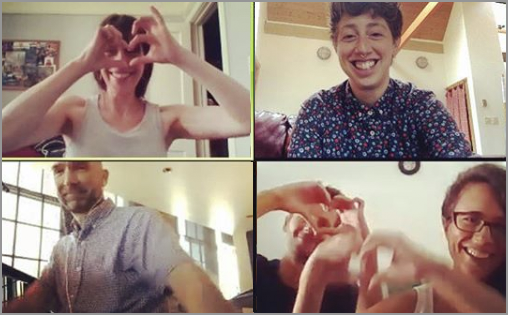Askance
The American Heritage® Dictionary of the English Language, 5th Edition.
adverb
1. With disapproval, suspicion, or distrust.
2. With a sideways glance; obliquely.
3. With disdain, envy, or suspicion.
If you’re a multipotentialite, there have probably been scores of things you’ve wanted to explore throughout your life. Some, you did. Some, you decided against. And some, you probably just forgot about.
If every single one of those things were only explored inside your head, then—no matter what happened—no one was the wiser. Your friends, family and strangers never got the chance to weigh in. However, if you let even one of these sparks of interest spill out of your head and explored it out loud, others in your circle may have looked at you askance.
Many of us multipotentialites are familiar with others looking at us askance.
When we announce something new we want to explore, the people around us—especially those closest to us—are probably going to have thoughts and emotions that may not align with our own.
You might feel exhilarated at the prospect of a cross-country RV adventure. Your partner might dread it as a month of chaos. You may be intrigued by a move to a new division in your company. Your co-workers might not be so on board.
Even if we think we’ve become numb to the askance looks thrown our way, surprising bursts of negativity from those around us can make us feel deflated. Depressed. Suddenly unmotivated.
There are plenty of ways for multipotentialites to deal with unsupportive comments or looks. But first, let’s break down what’s actually going on behind them.
What they said
So you’re super excited to try something new, but your partner, spouse, parents, or friends aren’t exactly jumping aboard your woo-hoo choo-choo. Before you’ve even finished exclaiming about your new passion, you might hear one of these:
Hmm. I’m concerned that [fill in the blank].
How will you fit that into your schedule?
But you don’t even know anything about [x]!
Are you sure you’re going to stick to this one?
These not-exactly-encouraging phrases can really bring you down. If you were jazzed before, you might start to feel more of the blues. Discouraging as these words can be, there’s likely more going on behind them than just plain old rudeness.
What’s actually happening
Before you immediately label the subject of your disillusionment a jerk (or worse) take the time to consider the person who made the comment.. While you may have several bees buzzing in your multipotentialite bonnet, maybe the other person is just trying to figure out what’s making all the noise. It’s worthwhile to consider if their comment is about you, or if it’s really about them.
Are they distracted or stressed about something else?
Are they trying to fall asleep? Hot tip: don’t make a major announcement just as your partner’s head is hitting the pillow. Joy will not likely follow.
Are they just allergic to bonnet bees?! Maybe they’re not capable of experiencing the same kind of giddy excitement you do about new things.
Of course, it’s also possible that it is about you, but not in the way you expect. The things that might be swirling around in the other person’s anxious head include, but aren’t limited to, the following:
Will you dump them, otherwise leave them behind, if things go well?
If you don’t know what you’re doing, will they have to bail you out, financially or emotionally?
Are you being selfish or egotistical in exploring this new passion?
Are you setting yourself up for failure?
On the surface, these concerns are about you, but when if dig a little deeper, they’re still about the other person. They may care about you and not want you to fail, but what if their concern is really about their own failures? Is it possible that their fears are getting in the way of celebrating your ideas?
What you can do about it
First, if a comment is making you doubt yourself, ask yourself:
- Is it true?
- If it were to be true, what might that mean or cause to happen? (This can be especially helpful is the comment is a future hypothetical—a “what if”)
You can also prepare for these experiences in advance, by making a list of questions to ask yourself when you hear a negative comment. The answers you give yourself can help you analyze your own feelings about your new venture—and separate them from external criticism or doubt. Here are some of the questions I commonly consider:
What if I fail?
I’m not an advocate for envisioning failure, but it can be worthwhile to briefly explore the idea. What circumstances will you find yourself in if you do fail? What does failure even mean in the context of your new idea, endeavor, business, project, pet rocks, etc.?
For example, if there’s a lot of money at stake and you lose it all, will you still be able to feed, house and clothe yourself and your family?
What if I get bored with this thing later?
This happens to a lot of people, and is a common worry in my family. When we multipotentialites start something new, we’re filled with excitement and joyful anticipation. Then, as we get further into something, we occasionally realize it wasn’t quite the thrill we thought it would be.
There’s absolutely nothing wrong with exploring a new idea and then letting it go. Even if it ends, the experience is yours to keep forever. Multipotentialites define “finishing” differently than other people, anyways. We’re done once we’ve gotten what we came for.
Do I really know what I’m doing?
What if you don’t? Especially if it’s something you’ve never done before, how would that even be possible?
Part of the joy in trying something new is the learning and discovery. Read again: What if I fail?
How will I fit this into my schedule?
It can seem like there’s never enough time to do all the things you want to do. Maybe that’s even true sometimes.
It’s really a matter of prioritization. You may have to move some things around to make room for your exciting new thing. Ask yourself what’s most important to you and what you cannot afford to shift (like work, or caring for your child). If you make a well thought-out, conscious plan, no one can question your ability to keep doing your life. Not even you.
Just enjoy the experience
Understanding what you’re feeling about your new adventure can give you the confidence to weather the negative comments and doubtful looks being thrown in your direction. With a little reflection, you’ll know which of others’ anxieties are about you and which are about them—and you’ll have a little inkling of the things that might not become clear until you go ahead and dive in.
Allow yourself to simply enjoy your new pursuit for the experience. The experience is all yours. And, when you’re confidently having a great time exploring your new interest, no one can look at you askance.
Your turn
What’s your latest new passion? Have you gotten any negativity from friends or family members when sharing with them about it? Let us know in the comments!

Doing/being/exploring ALL THE THINGS is easier with a community!

Did you know we have a private community of hundreds of multipotentialites from around the world? We support each other, share advice and cheer each other on as we building lives and career around ALL our passions.
Learn more about the Puttyverse and get notified next time we open the doors:


I love being a multipotentialite. I’m realizing more and more that some in my circle aren’t as excited about it as I am. ?
Hi Jo,
Sometimes it really hits home what a different mindset being a multipotentialite is, right? It’s fascinating how some people immediately identify and others can’t even wrap their brain around wanting to be involved in so many interests. That’s what’s so great about this community. We all know what it’s like to explore so many ideas and projects on a regular basis. 🙂
I think the internalized “askance” is do much of what I (we?) have been working on healing/reframing. All that external judgement and fear and contrast is something that is so easy to internalize. Even being a multipotentialite champion for many years now, I find I still judge myself through the eyes of others when I dont “finish” something. I think that being able to have meaningful conversations with loved ones who dont understand, as is laid out so clearly in this article, can be a great avenue to find those stuck points inside. I love that the personal inquiry is encouraged here. When I am fully on board and believe in myself and my putty nature (which is not all the time) no askance gaze can budge my enthusiasm. The judgement only sticks if it finds its echo inside myself. Of course, practicalities of partnership and family are more nuanced than an attitude, but I think seeing it as their issue really can only come when I believe in myself fully. All this is just to say the same thing in a different way. Great timing on this article ans great reminders.
Thanks, Cristina! It’s taken me a lifetime to slow down and not immediately internalize those external comments. Wait – who am I kidding, I’m still working on it, lol.